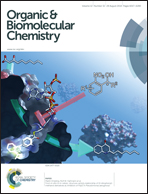TFAA/H3PO4 mediated unprecedented N-acylation of carbazoles leading to small molecules possessing anti-proliferative activities against cancer cells†
Abstract
For the first time TFAA/H3PO4 has facilitated the direct and metal-free N-acylation of carbazoles leading to a number of N-acylated derivatives. Several of these compounds were found to be promising when tested for their anti-proliferative properties against oral cancer cell lines.


 Please wait while we load your content...
Please wait while we load your content...